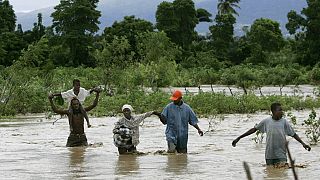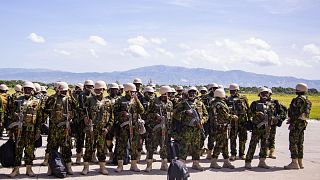Kenya
A week-long summit tackling global plastic pollution concluded on Sunday at the headquarters of the United Nations Environment in Nairobi, Kenya. With over 2,000 delegates in attendance, the talks focused on drafting a treaty to combat the growing problem of plastic.
Last year, 175 countries committed to the conclusion of a binding agreement to combat plastic pollution by 2024. The meetings in Nairobi were the third of five sessions set to be completed by next year so that the treaty can be adopted in 2025.
However, as the meetings wound up on Sunday, delegates remained divided as to the treaty's substance.
"Nature is suffocating"
"Nature is suffocating, gasping for breath. All ecosystems [...] are under threat from plastic pollution," said Jyoti Mathur-Filipp, executive secretary of the treaty negotiating committee. "We hold in our hands the power to correct this destructive course."
With plastic pollution everywhere from oceans to mountaintops, and production set to triple by 2060, NGOs say that focusing on plastic reduction and not recycling should be the way forward.
NGOs have called for a 75% reduction in production by 2040. However, oil-producing countries and plastic industry lobbies, also represented at the summit, are arguing in favour of recycling and better waste management.
UNEP executive director Inger Andersen said nations agreed to develop a treaty that dealt with the entire life cycle of plastics -- from production at their source, to their design and use, to final disposal.
"We cannot recycle our way out of this mess," she told AFP on the sidelines of the talks.
Environment groups attending in Nairobi accused a so-called "low ambition coalition" of largely oil-producing nations including Iran, Saudi Arabia and Bahrain of aligning to frustrate the talks.
"We have seen these countries move actively to prevent these negotiations from beginning, to prevent them from moving to substance, and to slow down those discussions," Carroll Muffett from the Center for International Environmental Law told reporters.
"An existential threat"
Kenya is among the 60 so-called "high ambition" nations called for binding rules to reduce the use and production of plastic, with President William Ruto calling on delegates to make progress in the discussions.
"I urge all the negotiators to recall that 2024 is only six weeks away and (there) are only two other meetings to go," Ruto said at the opening of the talks.
"This kind of polluting our environment is unacceptable and is essentially an existential threat to life, to humanity and everything in between."
After the Kenyan capital, the negotiations are due to continue in April 2024 in Canada, concluding in South Korea at the end of 2024.
The Nairobi negotiations come just a few weeks before the start of the COP 28 climate conference in the United Arab Emirates, which aims to reduce greenhouse gas emissions and help developing countries cope with the consequences of climate change, following a year marked by devastating weather events.












01:42
Gaza residents welcome rare organized aid delivery after months of chaos and hunger
01:40
Kenya protests turn violent as court, activists demand justice for victims of police brutality
01:50
UN urges renewed political and climate action in Libya amid humanitarian and governance crises
00:58
Cash crunch stalls UN probe into possible war crimes in DR Congo
01:07
Kenya prepares for first anniversary of Finance Bill protests
01:37
South Africa calls for peaceful resolution to Israel-Iran conflict